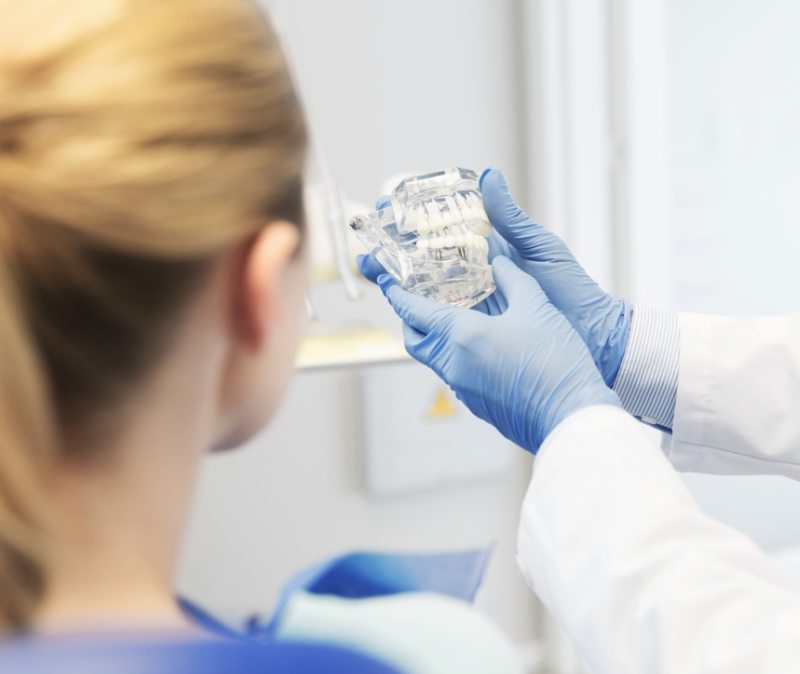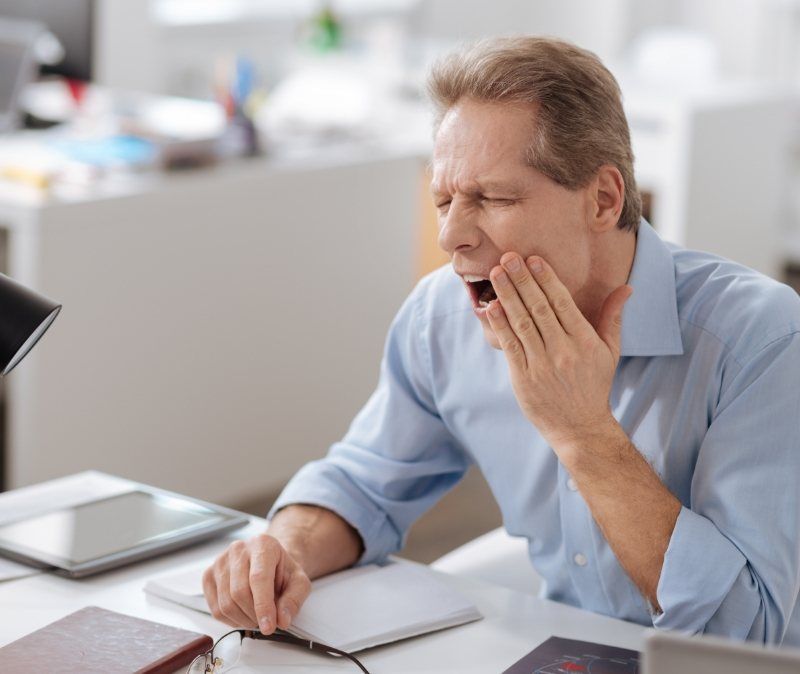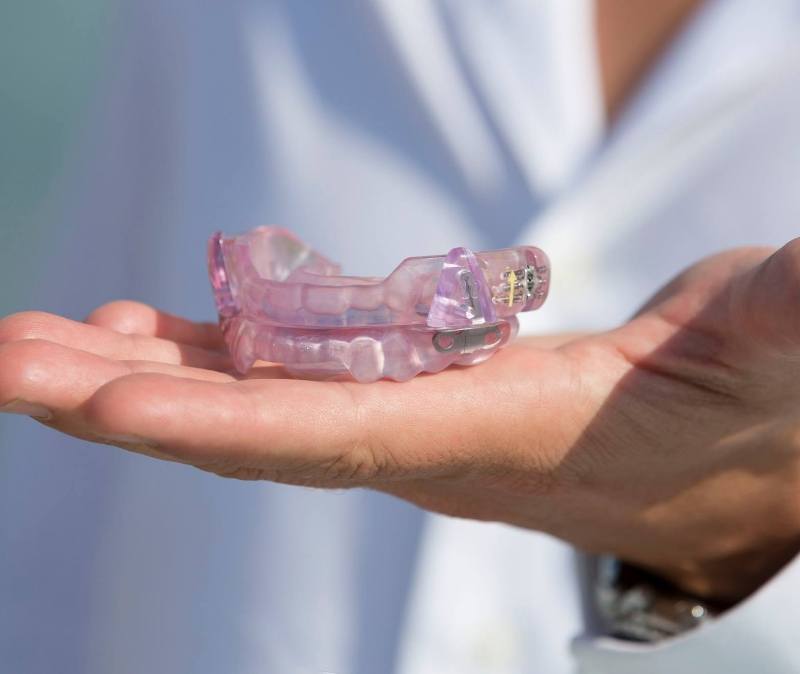TMJ & Bruxism Treatment – Beachwood, OH
Stop Chronic Jaw Pain in its Tracks!
Have you ever woken up from a deep night of sleep only to experience jaw, neck, or upper back pain? As you brush your teeth, have you noticed that some of your teeth appear “filed down” but are not sure why? As a team of holistic dentists, Dr. Schlessel and Dr. Hornstein are aware of the many ways in which a dental problem can manifest into a much larger issue that affects your quality of life. If you experience these symptoms or other problems mentioned on this page, please call The Center for Advanced Dentistry to schedule an appointment. We can perform a thorough examination and provide recommendations for TMJ and bruxism treatment at our Beachwood, OH dental office.
Why Choose the Center for Advanced Dentistry for TMJ & Bruxism Treatment?
- Holistic Approach to Dentistry
- Custom Solutions for Jaw Pain & Headaches
- Trusted by Beachwood for 30+ Years
What is TMJ and Bruxism?

The TMJ refers to the temporomandibular joint, which is a pair of joints that connect the skull to the lower jaw. These joints are responsible for the many complex movements your jaw makes while chewing, yawning and performing other basic tasks. Long-term stress on this joint can result in TMJ disorder or TMD. Bruxism is a condition that involves involuntary grinding or clenching of the teeth. This condition can easily develop as a result of stress, but it’s more likely to develop due to an uneven bite, known as a malocclusion.
While it may not seem obvious at first, the implications behind TMJ and bruxism are even more serious than you could imagine. Pain or dysfunction related to the way your bite comes together or how your joints move can directly influence neighboring areas of your body. For example, an uneven bite can put more stress on your muscles as well, which leads to chronic pain and worn-down enamel. The joints responsible for your basic chewing functions can become overworked, forcing the muscles in your jaw, neck and shoulders to overcompensate. Furthermore, TMJ problems are generally caused by sleep apnea, a chronic condition that affects your ability to get a good night’s sleep.
What are the Symptoms of TMJ and Bruxism?

If your bite is uneven and your TMJ experiences disproportionate amounts of stress, it can lead to many issues down the road. Just a few of these symptoms include:
- Chronic headaches or migraines
- Clicking or locking of the jaw
- Jaw, neck, shoulder and upper back pain
- Clenching and grinding of the teeth
- Erosion of the upper and lower teeth
- Earaches and ringing in the ears
- Waking up tired or drowsy even after going to bed early
How Can Our Dental Office Help?

Thankfully, we practice neuromuscular dentistry as part of our mission to provide effective holistic dentistry to the Beachwood, Cleveland, Shaker Heights, Solon, Pepper Pike and other neighboring communities in Ohio. When you visit our dental office, our team can perform a thorough examination of your jaw and its mobility. We will go over a number of options proven to ease the symptoms caused by TMJ disorder and bruxism. With the help of a sleep test, which we can provide in-office, we can also differentiate true TMJ problems and sleep apnea to create a more comprehensive diagnosis.
One of the most common solutions to TMJ and bruxism symptoms is an orthotic device. This is typically worn while you sleep to reduce teeth grinding and stress on the jaw. Other non-surgical treatment options include neuromuscular massages and the use of a TENS unit. This machine administers electrical currents that interrupt the pain response triggered by TMJ disorder and bruxism. In the event that these treatments are not enough, you’ll receive a referral to another trusted medical or dental specialist for further consideration.
TMJ Frequently Asked Questions
Even if you’ve been living with TMJ problems for years, you may not have encountered a lot of the terminology on this page. So, you likely have questions, and you’ll find we’re ready to offer the answers. Before you call our dental office, you can get some important information below. For questions we haven’t covered here, you’re always welcome to reach out to us.
What Causes the Clicking Noise in My Jaw?
If you are struggling with TMJ disorder, it’s likely that you have noticed a subtle clicking or popping noise as you open and close your mouth. The main reason why this occurs is because the ligament that sits between the two bones is regularly dislocating and popping out of place. As it comes on and off the jawbone, it causes additional stress to your jaw, which is not normal. This noise can happen all the time or randomly throughout the day. Keep in mind that just because you don’t hear it doesn’t mean it’s not happening. Some patients may not notice the noise on their own, while others can hear it from multiple feet away.
Will TMJ Problem Cause Pain Right Away?
While we have mentioned many times that pain is a common complication of TMJ disorder, it generally does not appear until late into development. Essentially, you cannot solely rely on the presence of pain to have your TMJ disorder diagnosed, which is just another reason why routine exams are so important. Even as the ligaments and bone are breaking down, the temporomandibular joints are quite resilient. What’s far more common is pain that feels more like a headache or earache. As the muscle and space between the joints experiences stress, moving your head or neck will likely become more difficult. If you experience sharp shooting pains when opening or closing your mouth or notice dull unending aches in your muscle, you should come to our dental office for treatment.
Are My Chronic Headaches Related to TMJ?
Headaches can appear for a wide variety of reasons, which is why we recommend you visit a medical doctor for careful examination and evaluation as well. Because of the complexity that headaches can cause, it’s better to have opinions from multiple doctors as well as Dr. Schlessel and Dr. Hornstein. Depending on the type of headache you’re experiencing, the pain could be coming from an issue that’s inside the skull, the spine, or as a result of high blood pressure. It can even be caused by certain medications you might be taking. While we cannot guarantee that TMJ therapy can remove all headache issues, we have noticed that after a patient begins TMJ therapy, the occurrence of headaches generally drops.
What Happens If I Don’t Seek Treatment?
Like dental issues, TMJ problems are progressive in nature. That means that as time goes on, they continue to worsen. Any pain that you are experiencing now is likely to get worse without any kind of intervention. The progressive nature of discomfort usually follows the same path. It starts with short-term sharp pains here and there, then transitions into jaw inflammation, which results in tenderness of the muscles. You may also notice clicking and popping noises, which is a sign that you should be visiting our dental office. As time passes, it will become more difficult to perform certain jaw movements. The bony makeup of your jaw will also change. Even worse, tooth enamel will start to deteriorate, permanently affecting your ability to chew and the overall way your bite forms.
I Need a Checkup & Cleaning I Have a Cavity or Broken Tooth I am Missing One or More Teeth I Want to Improve My Smile I Want a Straighter Smile I am Worried About Gum Disease I Want to Learn About Sleep Apnea Therapy I am Interested in Holistic Dentistry I Have a Dental Emergency I am Scared of the Dentist View Our Services
